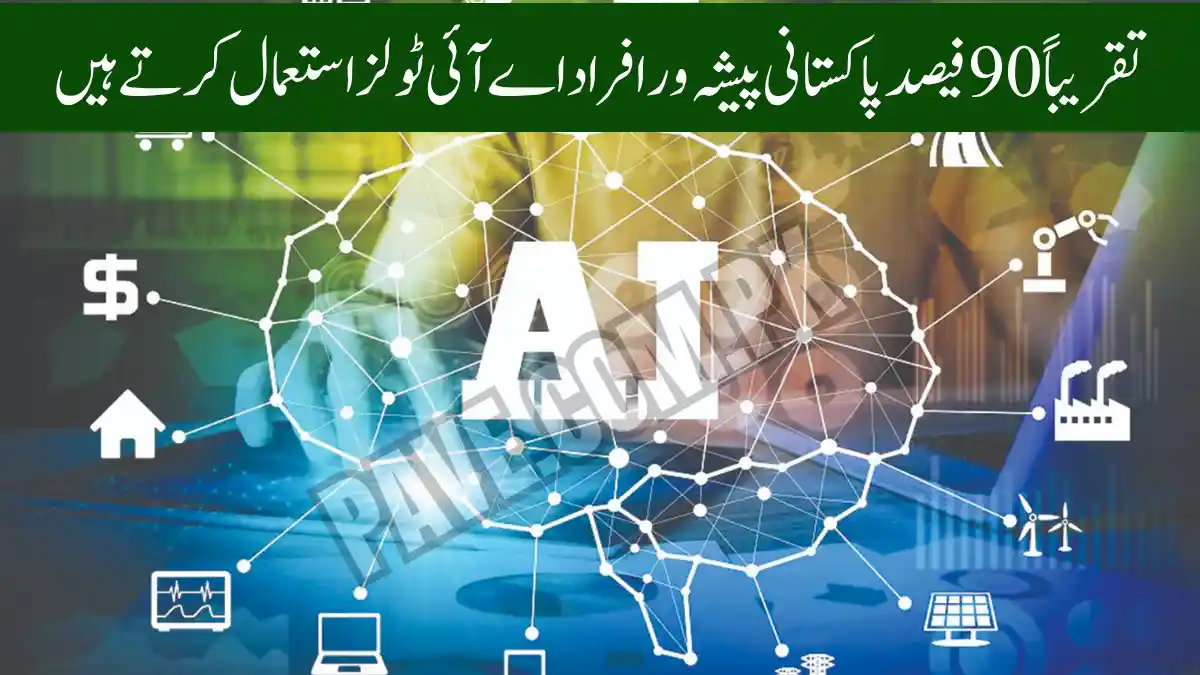Pakistan Professionals Adopting AI Tools Rapidly in 2025 — Transforming Work and Innovation
Artificial intelligence (AI) is no longer a futuristic buzzword in Pakistan — it has become an everyday tool powering offices, classrooms, startups, and even government departments. A recent study shows that Pakistan professionals adopting AI tools are driving one of the fastest technological transformations in South Asia, reshaping how people work, learn, and innovate.
According to the findings, nearly 90% of professionals in Pakistan now rely on some form of AI-powered assistance in their jobs — whether for writing, design, analysis, coding, or communication. This rapid growth in AI tools adoption in Pakistan 2025 marks a new chapter in the country’s digital revolution.
The Rise of AI in the Pakistani Workplace
The year 2025 has witnessed an extraordinary acceleration in Pakistan’s workforce using AI. From small businesses and marketing agencies to tech firms and banks, employees are integrating AI into daily workflows to improve accuracy, productivity, and creativity.
The digital transformation Pakistan 2025 is being driven by tools like ChatGPT, Gemini, Jasper, Canva AI, and Midjourney, which are helping users automate content creation, generate code, visualize ideas, and analyze complex datasets in seconds.
For example:
- Writers and marketers use AI to craft persuasive copy or social media campaigns.
- Developers and data analysts rely on AI to debug code and summarize data trends.
- Educators and freelancers employ AI for lesson planning, translations, and client management.
This adoption represents a massive leap for a developing economy where traditional work models dominated just a decade ago.
The Numbers Behind Pakistan’s AI Revolution
Kaspersky’s 2025 workplace study found that 86% of professionals in Pakistan have integrated AI into their work routines — one of the highest adoption rates globally.
Here’s how Pakistani professionals are using AI tools:
- 68% for writing, editing, and content creation
- 56% for designing images, infographics, or videos
- 52% for drafting professional emails
- 35% for analyzing or visualizing data
Meanwhile, 98% of respondents said they are aware of “generative AI” — a sign that artificial intelligence has moved beyond novelty into mainstream professional life.
The country’s growing population of freelancers and remote workers has also accelerated adoption. Platforms like Fiverr, Upwork, and local freelance hubs now feature Pakistani professionals offering AI-enhanced services, from logo design and copywriting to predictive analytics and chatbot development.
Why Pakistan’s Workforce Is Turning to AI
The surge in AI use reflects a deep shift in how professionals view technology. What began as a curiosity has now become essential for staying competitive.
AI helps users save time, reduce workload, and increase efficiency — critical benefits in industries with tight deadlines and high competition. For instance:
- Journalists use AI summarizers to condense long reports.
- HR teams use AI to screen CVs and automate scheduling.
- Architects use design algorithms to model energy-efficient buildings.
This shift also illustrates a generational transformation. Pakistan’s young, tech-savvy workforce — nearly 64% of the population is under 30 — has quickly embraced the artificial intelligence trends Pakistan is experiencing across creative, technical, and administrative domains.
Read More: SnapChat Down Globally Due to Amazon AWS Outage Today
Productivity and Performance: The New AI-Powered Work Culture
As AI becomes embedded in office life, professionals are discovering new ways to achieve more with less. The AI productivity tools 2025 now available in Pakistan allow teams to automate repetitive tasks and focus on strategic, high-value work.
Businesses are also reporting higher productivity levels after integrating AI tools for project management, communication, and analytics. A marketing executive in Lahore said his team’s content output has doubled since adopting generative AI for campaign ideation and customer insights.
“AI doesn’t replace creativity — it enhances it,” he explained. “It handles the groundwork so humans can focus on strategy and originality.”
The Untrained Majority — A Hidden Challenge
Despite the surge in usage, Pakistan’s AI revolution also exposes a significant training gap. Most professionals have learned AI through trial and error, with little formal instruction on safe or ethical usage.
Kaspersky’s findings show that only 52% of AI users in Pakistan have received training on data security or AI ethics. Another 21% admitted to having no training at all. This lack of awareness increases risks related to:
- Data privacy breaches
- Fake AI platforms and malware tools
- Prompt-injection attacks and phishing scams
- Dependence on unverified outputs
Without structured training, professionals may unknowingly share confidential information with public AI systems — a concern for corporate and government sectors alike.
AI Regulation and Company Policies Still Evolving
While Pakistan’s workforce embraces AI with enthusiasm, most organizations are still developing internal AI usage policies.
According to Kaspersky’s study, 81% of employees said AI tools are officially allowed at their workplace, but 15% said they’re banned, and 4% were unsure. This inconsistency suggests that many businesses lack clear frameworks on what constitutes safe and responsible AI usage.
Experts warn that without responsible AI governance, workplaces risk falling prey to “shadow AI” — where employees use AI tools outside IT oversight. Such unauthorized use can lead to serious data and compliance issues.
Industry Voices: The Case for Balanced AI Governance
Technology experts emphasize that Pakistan must pursue a balanced AI policy that promotes innovation without compromising security.
Rashed Al Momani, General Manager for Kaspersky in the Middle East, stated:
“A blanket ban on AI is unrealistic, and unregulated use is dangerous. The solution is controlled accessibility — each department should have AI permissions based on data sensitivity, supported by regular training.”
This approach aligns with international best practices that encourage AI ethics, transparency, and tiered access depending on organizational roles.
Pakistan’s Freelancers and Startups: Leading the Charge
Freelancers, entrepreneurs, and startups have emerged as the real flag-bearers of Pakistan’s AI adoption. With little bureaucratic resistance, they’ve been quick to integrate AI into their business models.
Freelancers use AI to:
- Write client proposals
- Generate visual designs
- Translate documents and scripts
- Build marketing automation tools
Startups, meanwhile, are exploring AI-driven fintech apps, language-translation bots, and agritech solutions for farmers — highlighting how AI tools adoption in Pakistan 2025 is enabling innovation even in non-traditional sectors.
Government initiatives like Ignite and National Incubation Centers are also supporting AI entrepreneurship through grants and mentorship programs.
The Future of Work in Pakistan — Human and Machine Collaboration
The future of work in Pakistan is shaping into a hybrid model where humans and machines collaborate rather than compete. AI handles repetitive or data-heavy functions, while professionals focus on creativity, decision-making, and emotional intelligence.
For instance:
- Doctors are using AI diagnostic tools to identify early disease patterns.
- Teachers use AI platforms to personalize student learning plans.
- Accountants rely on AI to detect anomalies in financial reports.
This human-AI partnership is improving accuracy, saving time, and redefining job descriptions across industries.
Read More: Amazon AWS Outage: Reason Behind the Major Failure That Took Many Apps Offline
Digital Transformation Pakistan 2025 — Beyond Productivity
Pakistan’s digital transformation isn’t just about automating tasks; it’s about changing mindsets. Businesses that once hesitated to adopt technology are now investing heavily in AI training, cybersecurity, and digital infrastructure.
The federal government’s initiatives under the Digital Pakistan Vision 2025 aim to expand digital literacy, promote safe AI integration, and encourage collaboration between public and private sectors.
According to industry observers, this ongoing transformation could add billions to Pakistan’s GDP by improving operational efficiency, expanding exports in the IT sector, and positioning Pakistan as a regional hub for digital talent.
Overcoming the Challenges Ahead
Despite the progress, several challenges remain on the road to a fully AI-driven economy:
- Lack of structured AI education at the school and university level
- Limited public awareness about data ethics
- Inconsistent broadband infrastructure in smaller cities
- Absence of local AI research investment
Experts suggest that the government and corporate sector must collaborate to build AI training centers, introduce AI-focused university programs, and develop national cybersecurity standards to ensure safe and sustainable growth.
The Road Forward — Educate, Empower, and Innovate
Pakistan’s growing embrace of AI represents more than just a technological shift — it’s a national evolution in mindset and capability.
To ensure that this transformation benefits everyone, the focus must now shift toward:
- Digital education — integrating AI literacy into formal curricula.
- Cybersecurity training — equipping employees to use AI safely.
- Ethical guidelines — ensuring transparency and fairness in AI systems.
- Inclusive access — extending AI training to rural and underprivileged communities.
With these reforms, Pakistan can unlock the true potential of artificial intelligence as a driver of innovation, equality, and economic strength.
Conclusion: A Defining Moment for Pakistan’s AI Future
The year 2025 will be remembered as the year Pakistan professionals adopting AI tools became a national movement. The trend has already transformed workplaces, improved efficiency, and inspired new industries to emerge.
Yet, with great progress comes greater responsibility. To sustain this momentum, Pakistan must bridge the AI knowledge gap, establish clear regulatory standards, and nurture a culture of ethical innovation.
If guided wisely, artificial intelligence could become Pakistan’s most powerful engine for growth and creativity — turning challenges into opportunities and redefining the future of work for millions.







